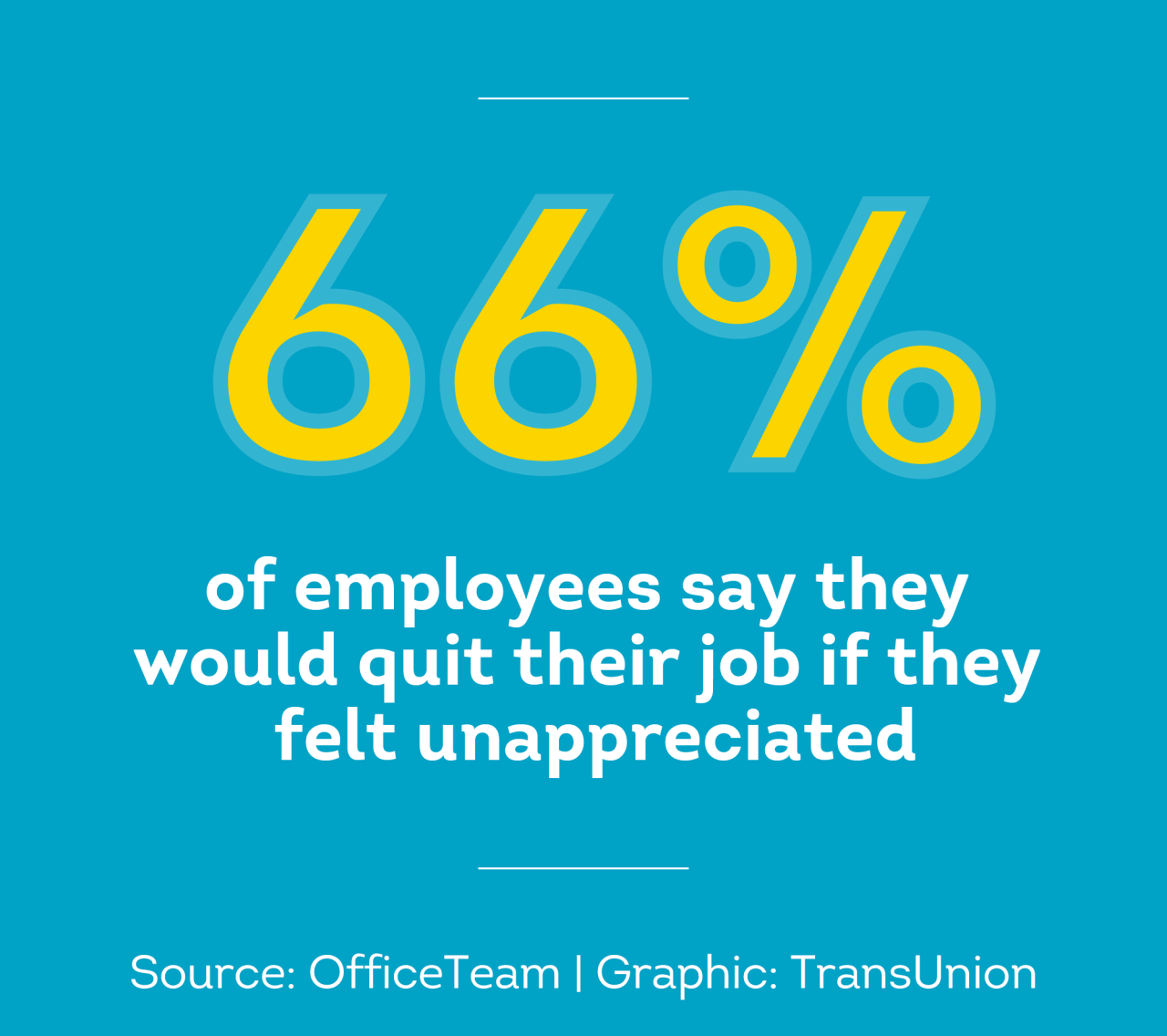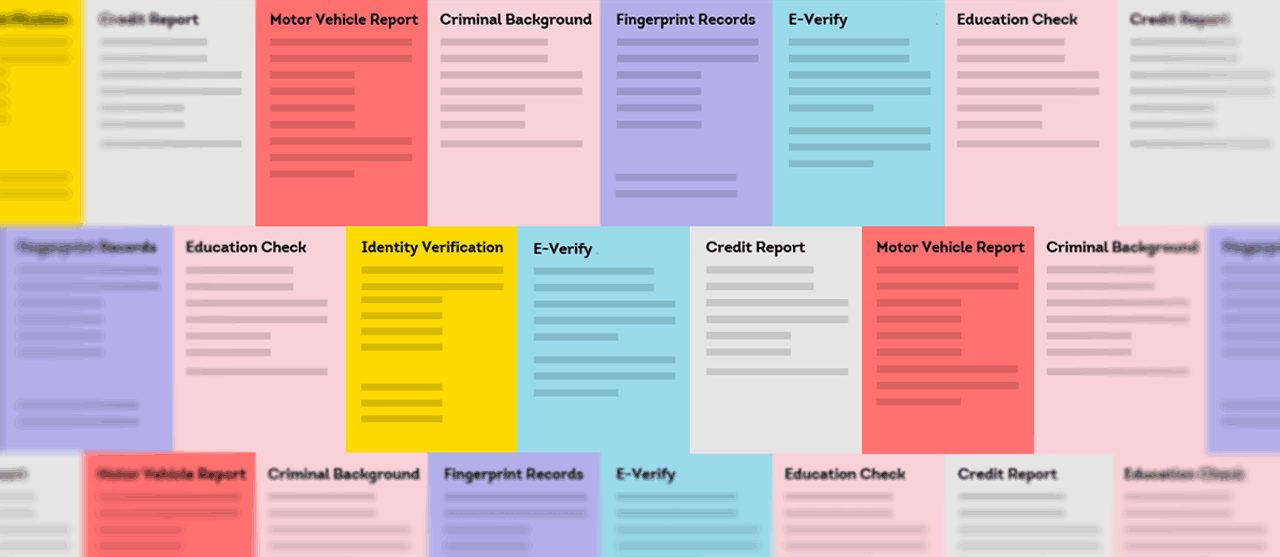Poor employee recognition programs can sink companies. With underappreciation being one of the top reasons great employees leave voluntarily, it’s vital to know what you can do to make staff feel valued. This article outlines how to create great employee recognition programs, ideas to help employees feel appreciated, and explains mistakes to avoid when doling out appreciation to your small business staff members.
Remember that this material is intended to provide you with helpful information and is not to be relied upon to make decisions, nor is this material intended to be or construed as legal advice. You are encouraged to consult your legal counsel for advice on your specific business operations and responsibilities under applicable law. Trademarks used in this material are the property of their respective owners and no affiliation or endorsement is implied.
In the old days, when a boat’s crew felt exploited, they’d simply mutiny. These days, burnt-out workers probably aren’t going to stage an all-out revolt. However, if your staff feels underappreciated they’re still quite likely to jump ship—leaving you with the fallout.
According to Gallup, replacing a worker who leaves voluntarily costs 1.5-2x the employee’s annual salary—and that’s a conservative estimate. In addition to the financial hit, team morale, productivity, and innovation plummets when your best employees leave. Plus, departing employees can have a domino effect that encourages other good workers to flee. Could your business take such a hit?
That same Gallup study states that the vast majority of cases where employees are completely avoidable. If business owners, managers, and others had taken the time to meet employee needs, disaster could have been avoided.

Among these top needs is employee recognition. According to research from staffing firm OfficeTeam, 66% workers said they’d leave their jobs if they didn’t feel appreciated. What would you do tomorrow if two-thirds of your staff walked out tomorrow because they were sick of feeling taken for granted?
To hire the best staff, you already know it’s imperative to screen job finalists with a pre-employment screening service like ShareAble for Hires. But, to keep the best staff, you need to work on making your workers feel valued. If not, they’ll head for the door.
Lack of appreciation is the hidden iceberg that’s just waiting to destroy your small business from below. This article outlines why employee recognition programs are important and highlights key points to keep in mind when creating measures to help staff feel valued and respected.
Here’s what you’ll learn:
Why Employee Recognition Programs are Important
Everyone knows that a good salary and solid benefits are crucial for making employees happy. However, often equally important, employees also want to also be treated fairly and recognized for the contributions they make to a business. Financial advice site Nerd Wallet lists “Feeling Overworked and Underappreciated” alongside “poor pay” in the top five reasons good employees quit.
Employee recognition programs are a necessity for setting up successful employee retention program that encourages your best employees to stick around. Recognition programs are especially important in small businesses, where staff members are expected to wear many hats.
The desire for recognition is a growing trend, especially among younger workers. Building in formal recognition programs is an important step for recruiting Millennial workers. After all, a stunning paycheck can make up for a draining work environment only for so long.
How to Create and Structure Successful Employee Recognition Programs
There are many different ways to let your employees know they’re doing a great job. Below you’ll find four general categories of employee recognition. For the best results, use a mix of these methods to help make your employees feel valued.

1: Offer Regular One-on-One Conversations and Ask for Feedback
You shouldn’t learn your employees are disgruntled, dissatisfied, overworked, or feeling underappreciated only when they come to submit their resignation letter. Similarly, you shouldn’t wait until the annual review to recognize good work.
One of the easiest ways to gauge employee satisfaction and dole out appreciation is through regular one-on-one meetings. Whether you meet weekly or monthly, here are some ideas for helping your employees feel valued in private meetings:
- Ask how they’re feeling about current projects and take note of answers
- Verbally compliment hard work and thank employees for their contributions and try to be specific.
- Example: “I noticed you worked really hard on getting the quarterly report done on time, even with all your other responsibilities with X project. Great job!” vs “Good job getting your work done on time!”
- Ask what they find enjoyable and frustrating about their work and discuss ways you can help fix any pain points
- Talk about work goals and where they want to go. Figure out ways to help them succeed.
It’s good to cultivate this culture of recognition through ongoing, open communication. When you do, employees feel more secure and don’t have to guess if you notice their work.
However, it’s important to find a balance between genuine appreciation and patronizing behaviors. Heaping on too much praise––especially for small tasks or core job responsibilities––can seem inauthentic and have the opposite effect.
2: Celebrate Anniversaries, Birthdays, Promotions, and Significant Dates
According to Harvard Business Review, there’s up to a 10% jump in employees looking elsewhere for jobs around the anniversary of their hire or promotion. There’s a similar spike around significant birthday milestones (such as an employee turning 30, 40, or 50).
To discourage wandering eyes, it’s especially important to make great employees feel appreciated around these milestones.
Here are a few Ideas for ways you can help employees celebrate significant dates:
- Pass around a congratulatory card for everyone in the office to sign. Make sure to add your own detailed, meaningful note of appreciation.
- Donate to a charity of the staff member’s choice or a cause they care about
- Provide a gift card to a coffee shop local restaurant (just make sure the amount is significant enough to cover an entire order)
- Give the employee a paid day or afternoon off
- Provide a full catered lunch or dessert for the entire staff
- Take the employee to lunch at a private club
- Gift big ticket items like a fancy watch, car, or all-expenses paid trip for extra-special milestones
When celebrating milestones, stay consistent between employees. Giving one person a gift card for an expensive restaurant and another a generic tote bag for the same milestone can backfire. These inconsistencies can make employees even more disengaged.
3. Provide Recognition for Special Jobs and Projects
In addition to predictable recognition through meetings and milestones, special projects and extra-challenging time periods can be great opportunities for employee recognition.
During times of increased work, employees aren’t always expecting recognition. Receiving appreciation comes as an extra special surprise.
It’s important to recognize staff members that put a lot of effort or time in a particularly challenging project, managed a difficult client exceptionally well, or had innovative ideas that help improve your organization in a meaningful way.
Here are some ideas for recognizing notable efforts:
- Send an email to all staff members that call out the employee’s good work and include sincere, specific compliments
- Provide a cash bonus
- Host a surprise party. If a restaurant dinner or catered lunch isn’t in the budget, even a small cake or some cookies can go a long way to make someone feel appreciated
4: Give Awards and Formal Recognition
On the formal end of the employee recognition spectrum, establishing in-house awards can be a great way to recognize and motivate staff. Awards could be as simple as creating an Employee of the Month program, or as involved as creating an annual banquet with awards that are customized to your business or field.
With formal awards, staff members are typically nominated by their managers and peers, or chosen by their supervisors based on performance data. Here are a few examples of the types of awards you could give your staff members:
- Rising Star: newer staff member who is doing a great job already
- Service awards: recognizing next-level customer service, selfless acts, unsung heros, etc
- Biggest contributor: most customers helped, most sales made, best metrics for resolutions or response times, etc
Presenting awards at a special event can make employees feel extra-appreciated. Consider hosting a company holiday dinner, summer picnic, or retreat. If it’s in the budget, have plaques or trophies made with the employee’s name and award title.
Of course, in addition to a trophy, employees appreciate receiving an extra prize for all of their hard work. Winner perks for formal recognition programs could include:
- Special parking spot
- Adding their name and/or photo to a wall in your business
- Extra paid time off, flex time, or remote work days
- Celebratory meal, catered from a restaurant of their choice
- A month of being exempt from less desirable work
- First crack at new sales leads or incoming client work
After you take the time to create awards, make sure to highlight them while writing your employee handbook.
5. Always Be Consistent and Communicate Changes
You spent time figuring out how to hire the best employees. To help keep them there, try to be as consistent with recognition as possible. Be considerate of the cost and impact of employee recognition at different levels. Giving one top performer a Rolex and another top performer a box of chocolate can leave the recipient with a bad taste in their mouth and can be worse than giving nothing at all.
However, if you are consistent with your recognition, employees know what to expect. This predictability makes it easy for employees to fix their eyes on the next milestone or award—rather than competing companies and recruiters
Sometimes new budgetary constraints require you to change. If you have to alter employee recognition programs, communicate the changes proactively. That way, no one is left surprised or expecting something that they will never receive.
Employee Recognition on a Budget
Employee recognition doesn’t have to be expensive. Many small businesses operate on tight margins. It makes sense that small companies can’t be as extravagant as giant, multinational corporations.
Huge bonuses, all-expense trips, and cush gifts are wonderful. However, sometimes the most appreciated form of employee recognition costs nothing but time. According to the OfficeTeam survey listed above, employees stated one of the top ways they felt appreciated was receiving a hand-written letter from the CEO.
Here are some ways you can make employees feel recognized with minimal financial cost:
- Write a personal, handwritten letter to the employee, recognizing their hard work. Remember to be specific, if it's a general or mass produced letter, employees will roll their eyes.
- Call out an employee’s exemplary performance during an all-hands or staff meeting. Again, the key is being personal and specific. Explain exactly why and how the employee has done great work.
- Send an all-company email publicly thanking the employee for their hard work
Employee Recognition Mistakes to Avoid
Sometimes less is more. If you’re not careful, your efforts at employee recognition can backfire. When trying to make staff feel valued, pay attention to the direct and indirect messages you’re sending.
Mistake 1: Recognition is Impersonal or General
A mass “thank you” email or printed card from a higher-up can come off as impersonal and inauthentic. It does nothing to make individual staff members feel recognized. Instead, it often reinforces the idea that they are just a nameless cog in a machine that doesn’t care about them.
Mistake 2: It’s Not Commensurate with Employee Effort
Imagine that you’re an overworked employee currently covering three jobs. You suddenly come up with an idea that saves the company thousands of dollars every month. In return, they give you a few pieces of candy and a company pen. How would you feel?
Many people would feel insulated and underappreciated. That’s because the small gesture does not match the massive contribution the employee made. If you’re not able to provide a raise, bonus, or monetary gift that matches the effort, consider providing perks like paid time off or prime parking.
Mistake 3: It’s Way Overdue and Becomes Meaningless
According to Forbes, delayed recognition is one of the top mistakes managers can make. Late rewards make employees feel like an afterthought. Feeling like your work is unimportant is extremely demotivating and can make employees start looking elsewhere.
Get Employees in the Door with Screening through ShareAble for Hires

While recognition programs really put the wind in the sails of top performers, you first need to find the kind of employees you want to keep around. Ill-fitting hires are like an anchor that holds your company back. Excellent employees send your business sailing forward into exciting possibilities. Help bring great talent onboard with extra-fast, online pre-employment screening through ShareAble for Hires.
Does your top job candidate have a history worth celebrating or are they hiding something sinister that could blow your business to smithereens? Help reveal the truth. Criminal record reports search your applicant’s information against millions of felony and misdemeanor records across dozens of state and federal-level databases. Meanwhile, identity verification helps you confirm that the job hopeful is really who they say they are.
With trustworthy data backed by TransUnion, employee credit reports can reveal the truth about your job applicant’s financial track record. Knowing how your candidate handles money is especially important when filling positions that handle money or personal data.
Once your applicant consents to the screening, FCRA-complaint reports are returned almost immediately. That way, you can spend time focusing on keeping great talent happy, instead of stressing about screening.
Don’t drag your small business down with ill-fitting hires. Help find the best crew to pilot your business onward with ShareAble for Hires.
ShareAble for Hires
Sign-up Now. Reports Now. Hire Now.







